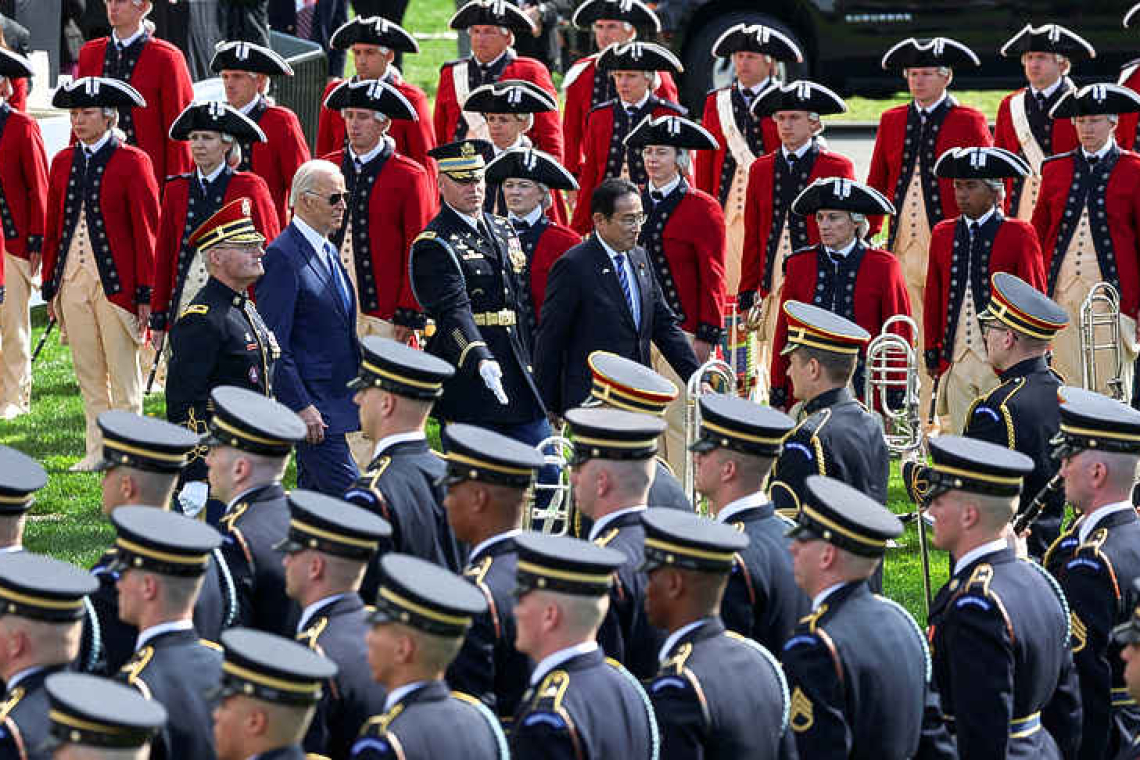WASHINGTON--U.S. President Joe Biden and Japanese Prime Minister Fumio Kishida on Wednesday unveiled plans for military cooperation and projects ranging from missiles to moon landings, strengthening their alliance with an eye on countering China and Russia. A joint news conference at the White House reflected the growing importance of Japan on the world stage and to the United States, as the two leaders weighed in on Gaza and Israel, Ukraine and Russia, North Korea and other world flashpoints. Biden and Kishida brushed off a dispute over Nippon Steel's offer for U.S. Steel, saying the issue was not a major factor in their discussions on a day of White House pomp and pageantry due to culminate in a lavish state dinner. "This is the most significant upgrade in our alliance since it was first established," Biden said after about two hours of talks that focused on the restive Indo-Pacific region, and China's actions. The United States and its allies, including Japan, have been bolstering their militaries to counter what they see as a growing threat from China in the South China Sea and the East China Sea, and to deter any attempt to seize Taiwan, a self-ruled Island that Beijing considers its own. Kishida said the two leaders discussed tense relations between Taiwan and China, and pledged to uphold international order based on the rule of law. Chinese leader Xi Jinping recently said outside interference could not stop the island's "family reunion" with mainland China. “Unilateral attempts to change status quo by force or coercion is absolutely unacceptable, wherever it may be,” Kishida said. The U.S. and Japan will continue to respond to such actions, including challenges from China, he said. “Regarding Russia’s aggression of Ukraine... Ukraine today may be East Asia tomorrow,” Kishida said. Biden also vowed to keep open lines of communication with China and said the U.S.- Japan alliance was defensive in nature. He spoke to Chinese President Xi Jinping last week. The announcements from Biden and Kishida brought the two old World War Two enemies into the closest collaboration they have had since they became allies decades ago. Biden said their militaries will cooperate with a joint command structure and they will, together with Australia, develop a new air missile defense network. The two leaders also announced that Japanese astronauts will participate in NASA moon missions. Overall, the U.S. and Japan have hammered out about 70 agreements on defense cooperation, including moves to upgrade the U.S. military command structure in Japan to make it better able to work with Japanese forces in a crisis. Japan, often described as the U.S.'s most important Asia ally and its largest source of foreign direct investment, is taking on a stepped-up global role after a series of security law changes in the past decade that have transformed its pacifist constitution. Kishida will address the U.S. Congress on Thursday and join Biden and Philippines President Ferdinand Marcos Jr. for a meeting expected to focus on Beijing's South China Sea incursions. The meeting took place as China steps up pressure on the Philippines in the South China Sea over areas Beijing claims but international law says belongs to the Philippines. China is attempting to isolate Japan and the Philippines, a U.S. official said. By meeting the leaders of those two nations this week in Washington, Biden is aiming to "flip the script and isolate China."







